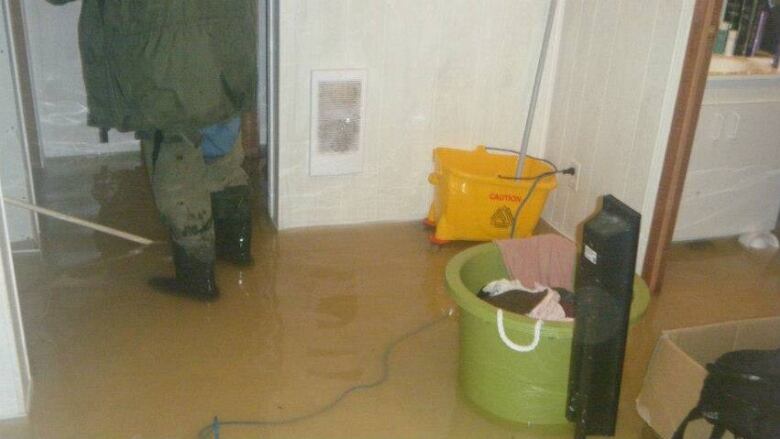Flooding forces partial evacuation of Kashechewan, Attawapiskat
Sewer backup floods homes in remote northern Ontario reserves

A partial evacuation was underway Wednesday in theKashechewan First Nation, and somefrail and elderlyhave already been flown out of Attawapiskat First Nation,as flood problems worsen forthe James Bay Coast communities.
Both Attawapiskat and Kashechewan declared a state of emergency after sewer backups flooded basements earlier this week.
Kashechewan chief Derek Stephen told CBC News 40 homes have water and sewage in the basement. The water has also ruined thefurnaces.
"[People] are in the homes right now, just trying to keep warm," he said."All the units don't have heat. All the furnaces have been shut down due to the water levels."
Stephen said with the temperature set to go below zero Wednesday, the decision was made to airlift all 200 people affected by the floodingto the town of Kapuskasing for emergency shelter.
They were tostart boarding flights on Wednesday morning.
"Some houses, they are four to six feet under water in the basements. It has never been quite that severe,"Stephen said.
Kashechewan has experienced several similar evacuations in the past decade.
Stephen said his community is also under a boil water advisory, because flooding has affected the community's water treatment system.
Schools are closed, because they don't have working toilets.
It's unclear how long it will be before residents can return home.
Attawapiskat hospital evacuated
In Attawapiskat, the band office said at least a dozen homes have sewage in the basement.
Attawapiskat Deputy Chief Gerald Mattinas told CBC News the band met with federal and provincial officials on Tuesday to determine next steps.
"In the community, we don't have any accommodation to move [people]," Mattinas said. "However, we will try to do our best to keep people in the community for now."
Late Tuesday, Emergency Management Ontario said no further evacuation is planned for Attawapiskat.
Ten patients who were staying at the hospital have already been flown to other communities in northern Ontario, including Kirkland Lake, Englehart, Cochrane, Iroquois Falls and North Bay, said De-Anne Sheppard, director of patient care for the hospital in Attawapiskat.
Some nurses have also been flown out because their housing was affected by the sewer backup, Sheppard said Tuesday.
"We have lost over 50 per cent of our housing," she said. "We had to put some folks in hotels last night. And we are sending some more [nurses] out today."
Sheppard said the hospital must continue to provide emergency care as long as people remain in Attawapiskat. For now, a temporary emergency clinic has been set up at the community's health centre.
She added that health officials are advising anyone with sewage in their homes to find somewhere else to stay.
"We have houses now that have been sitting with the effluent water in their basements for more than 48 hours," she said. "It's a real crisis."
Schools have also been closed in Attawapiskat because the teachers' residence has been affected.
Flood assistance funding provided
Meanwhile, Aboriginal Affairs Minister Bernard Valcourt's office said the priority is ensuring the health and safety of members of both communities and officials are prepared to offer help, if needed.
In an e-mail to CBC News on Monday, spokeswoman Andrea Richer said the government has already provided funding directly to six Ontario First Nations, including Attawapiskat, and to the Mushkegowuk Tribal Council, to prepare for possible flooding this year.
"These funds are intended to support flood watch and emergency preparedness activities, including the hiring of an emergency response co-ordinator for the Mushkegowuk Tribal Council, hiring and training of safety officers in each community at risk of flooding, purchase of extra fuel for river surveillance activities, and the purchase of safety equipment," she wrote.












_(720p).jpg)


 OFFICIAL HD MUSIC VIDEO.jpg)
.jpg)



























































































